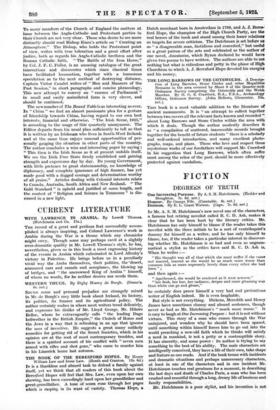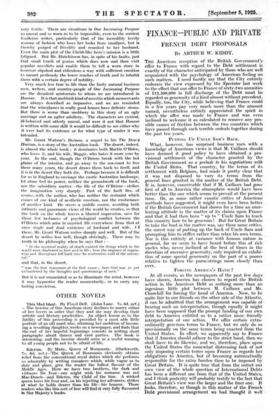FICTION
DEGREES OF TRUTH
Daimon. By E. L. Grant Watson. (Cape. 7s. 6d. net.) Ix Mr. A. S. M. Hutchinson's new novel one of the characters, a famous but retiring novelist called B. C. D. Ash, makes it clear that he has been hurt by the literary critics. Mr.
Hutchinson has only himself to blame if the reader takes this novelist with the three initials to be a sort of ventriloquist's dummy for himself as a writer, and he has only himself to blame, too, if the reader takes a particular interest in discover- ing whether Mr. Hutchinson is so bad and even so ungram- matical a stylist as the critics have said B. C. D. Ash is. When he writes :—
" His thought was all of that which she must suffer if °he came out marred, marred as she would be as much more worse than common folk as more supremely lovely-than every other she had been " ;
and then again :-
" Apotheosed, she would be rendered as it were °swoon."
" her flesh, her hue, her radiance, deeper and more gleaming was than white can go and gleam,"
he certainly does prove himself a very bad and pretentious writer of English indeed. He is even laughable;
But style is not everything Dickens, Meredith and Henry James have sometimes clumsy and absurd sentences, though never as bad as Mr. Hutchinson's " much more worse." It is easy to laugh at One Increasing Purpose : but it is not without virtues. This story of a man who comes through the War uninjured, and wonders why he should have been spared.
-until something within himself forces him to go out into the
world preaching a new-old faith which he thinks will satisfy a need in mankind, is not a petty or a contemptible story. It has sincerity, and some power : its author is trying to say something to the best of his ability. The male characters are intelligently conceived, they haye a life of their own, take shape and feature as one reads. And if the book teems with incidents and dramatic situations and perhaps unnecessary characters, at least in one of the characters and in one incident Mr. Hutchinson touches real greatness for a moment, in describing the last days and death of Charles Paris, a man who has been crushed and resentful through a long, dreary life of business and family responsibilities. .
_ Mr. Hutchinson is a poor stylist, and his invention is not'
very fertile. There are -situations in One Increasing Purpose so unreal and so worn as to be imposSible, even to the sorriest feuilleton writer, particularly that of the incredibly lowly woman of fashion who loses h_er looks from smallpox, but is thereby purged of frivolity and reunited to her husband. Even the main plot of the Christ-like hero's mission is a little fatigued. But Mr. Hutchinson has, in spite of his faults, just that small touch of genius which does now and then visit popular novelists and enable them to tell a worn story in however slipshod and ridiculous a way with sufficient emotion to mount perilously the lower reaches of truth and to inhabit them with a certain degree of-nobility.
Very much less true to life than the fairly natural business men, writers, and country-people of One Increasing Purpose are the decadent aristocrats to whom we are introduced in Honour. It is that snobbish kind of novel in which menservants are always described as impassive, and we are reminded that the wineglasses in really good homes have delicate stems.
But there is worse than snobbery in this story of an ugly marriage and an uglier adultery. • The characters are cynical, ill-behaved and utterly unreal, and were it not that Honour is written with some skill it would be difficult to see either why it ever had its existence or for what type of reader it was intended. '
Mr. Grant Watson's Daimon, a sequel to his The Desert Horizon, is a story of the Australian bush. The desert, indeed, is almost'the whole book ; it dominates both Martin O'Brien, who loves it, and his wife, Maggie, who hates it more year by year. In the end, though the O'Briens break with the hot plains of the interior, and go away to the sea-coast .to live there many years, the desert draws them back to itself, and it is in the desert they both die. Perhaps because,it is difficult for us in England to envisage the exotic Australian landscape, let alone feel its power, neither the groundwork of the book, nor the subsidiary matter—the life of the O'Briens—strikes the imagination very sharply. Part of the fault lies, of course, with the author, who has neither the restraint which comes of one kind of aesthetic emotion, nor the exuberance of another kind. He steers a middle course, avoiding both intimate and panoramic views of the world he 'creates, so that the book on the whole leaves a blurred impression, save foi those few instances of psychological conflict between the O'Briens which arise in married life everywhere from that at once single and dual existence of husband and wife. C f these, Mr. Grant Watson writes sharply and well. But of the desert he writes less well, though strivingly. There may be truth in his philosophy when he says that :- " In the mystical reality of death existed the things which in the world were shadowed in love and in life ; here the unpeace of separa- tion and divergence fell back into the motionless void of the univer- sal," and that, in the desert,
" was the first innocence of the first cause ; here God was as yet unburdened by the thoughts and questionings of men."
But it is not enunciated so as to illuminate the mind, however it may hypnotise the reader momentarily, or to carry any lasting conviction.











































 Previous page
Previous page